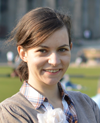 Irena Bojarovska,
Irena Bojarovska,
BMS Phase II student,
MSc St. Petersburg State University
I came to Berlin in October 2012 after obtaining my Master’s degree in Applied Mathematics and Mechanics at the St. Petersburg State University in Russia. Originally, I come from Macedonia, which I left after finishing high school to do my Bachelor’s studies in Russia, in Rostov-on-Don.
In the search for a place to do my PhD studies, two things were most important: first, to find a supervisor who works in the area I am interested in (applied harmonic analysis), and who would potentially become my supervisor, and second, to find a graduate school and scholarship for the university/country I chose. I found Prof. Gitta Kutyniok, and from her webpage at the University of Osnabrück, I could already imagine working with her and saw potential directions for my PhD. But I did not know of any structured graduate programs in this university. When I saw the poster for the BMS in our university, I checked it online and was very interested in becoming part of such a challenging program.
The next step was to check whether I could find a potential adviser in Berlin. I was positively surprised, but also puzzled to see Prof. Kutyniok in the list of the BMS faculty. The answer was - she was in a transition period from Osnabrück to Berlin and she was just starting to form a new group on applied functional analysis at TU Berlin. I was very happy to be able to find that perfect match, and lucky that it turned out all right in the end.
Unfortunately I missed the BMS Days and came to Berlin only in April. I must say that I did not have the best first impression of the city - I managed to see only the area around Kurfürstendamm, and it was somehow too fancy, too loud and too busy for me. But the discussion of my prospective graduate studies was so satisfactory, that I was nevertheless convinced to come to Berlin. The second positive surprise came after I moved here: Berlin has so much more to offer, and is so diverse and rich, that I cannot imagine the type of person who would not be able to find his or her favorite places in Berlin. Moving from eastern to western European culture could have been a bit of a problem - but for this we were perfectly well prepared at the BMS orientation week, which I was happy not to miss. The language course, the intercultural training, the buddy program - all of this helped me to fit in to Berlin and its mathematical community very fast and easy.
Being a student representative for one year gave me a unique opportunity to also learn about the BMS from the inside - how important decisions are made, how serious and difficult the admission process is, how lively and adaptable to the benefit of the students. The opportunity to organize and participate in social activities was another plus, and it was great to have the kind support from the BMS for this.
After more than two years spent at the BMS, I can certainly say that I am very happy to be a part of this family - and it can certainly be called a family, because it is a place where everybody cares about each other, and everyone does the best to succeed not only as an individual, but to help everyone else also to develop and move further. It is so nice to see how the BMS grows and improves with every year, and how Berlin continues to become a larger center for mathematics in a variety of fields. To be part of all this is very exciting.
published in May 2015
Update 2015: Irina defended her doctoral thesis in September 2015.
Update 2018: Since 2016, Irina has been working as an analyst in Berlin.






















